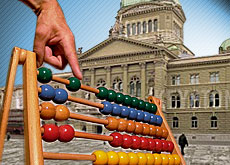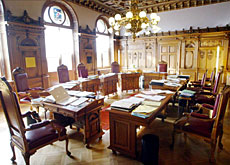Cabinet vote challenges government make-up

A second cabinet seat for the rightwing Swiss People’s Party would alter the way seats are shared out among Switzerland’s four main parties.
But analysts do not believe a change would sound the death knell for the Swiss power-sharing system, known as the “Magic Formula”.
Since 1959, the Magic Formula system has shared out the seven cabinet seats among Switzerland’s four main political parties according to their electoral strength at the time.
But immediately after October’s parliamentary elections – in which the People’s Party became the largest party in parliament – the Swiss press predicted the end of the current system of consensus government.
Hans Hirter, a political analyst, however believes that a change to the formula would simply be an adaptation of the system reflecting the relative strengths of the parties.
“All four parties will still be represented in government,” Hirter told swissinfo.
“But because their electoral support has changed over the years, it’ll simply mean the People’s Party will have more seats while the weakest party – the [centre-right] Christian Democrats – will have fewer.”
Death knell
Jeremias Blaser is another political analyst who believes that neither the parliamentary elections nor the likely outcome of the cabinet vote sound the death knell for the Magic Formula.
“The Magic Formula has simply been a way of ensuring the numerical composition of the government for the past 40 years,” he told swissinfo.
“I wouldn’t speak of a change in the make-up of the government as a threat to the continued existence of the Magic Formula,” he added.
Even if the Magic Formula were no longer feasible, such as in the case of any one of the four parties walking out of government to form a parliamentary opposition, Blaser insists it would not undermine the stability of the Swiss political system.
“Switzerland has been governed for a longer period in history without the Magic Formula, and there is no reason why that could not be the case in the future,” he said.
“The government is just one element in a whole set of institutions, including direct democracy and parliamentary power, and it’s not because one thing changes that the whole system is going to change.”
Brainchild
The Magic Formula was the brainchild of the Christian Democrats – the party now seen by many as most at risk of losing one of its two cabinet seats to the People’s Party.
In the 1950s it joined forces with the centre-left Social Democrats to persuade the centre-right Radical Party to agree to a redistribution of seats in a way that mirrored the linguistic and political landscape of the time.
Since 1959, the government has been made up of two representatives for the Radicals, the Social Democrats, and the Christian Democrats, and one from the People’s Party.
It is an informal arrangement – there is nothing written down on paper and there is no legal or constitutional obligation for the parties to stick to the deal.
“It’s really just a gentleman’s agreement,” said Hirter, “and there’s nothing to stop the government being formed by just one, two or three parties.”
Stake
The division of seats still corresponds to the linguistic diversity within Switzerland (four German-speakers and three from the French and Italian-speaking parts of the country).
But the rise in the People’s Party and the decline of the Christian Democrats means that the Magic Formula is now out of sync with the parties’ electoral support.
The shift in popular support has fuelled calls by the People’s Party for a second seat in government – at the expense of the Christian Democrats.
The party has threatened to withdraw from the government unless its official candidate and controversial driving force, Christoph Blocher, wins a cabinet seat.
But in spite of that threat, Clive Church, an expert on Swiss politics at the University of Kent in Britain, believes there is enough broad support for the Magic Formula to survive.
“Virtually all the parties – with the exception of the People’s Party – have ruled out withdrawing from the government,” he told swissinfo.
“Opinion polls also make it clear that the Swiss electorate likes to see the main parties represented in the cabinet, which is what the agreement allows for.
“It gives the people a stake in the government.”
swissinfo, Jonathan Summerton
The Magic Formula was introduced in 1959 to share seats among the four main parties in a way that mirrored the linguistic and political landscape of the time.
Under the agreement the Social Democrats, the Radicals and the Christian Democrats each have two seats, the People’s Party one.
Switzerland’s linguistic divide: 63.9% of the population are German speakers, 19.5% French, 6.6% Italian, and 0.5% Romansh.
October’s parliamentary elections: the People’s Party won 26.6% of the vote, the Social Democrats 23.3%, the Radicals 17.3%, and the Christian Democrats 14.4%.

In compliance with the JTI standards
More: SWI swissinfo.ch certified by the Journalism Trust Initiative










You can find an overview of ongoing debates with our journalists here . Please join us!
If you want to start a conversation about a topic raised in this article or want to report factual errors, email us at english@swissinfo.ch.